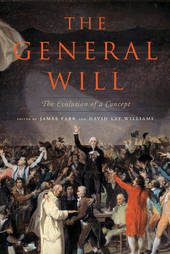
|
The General Will: The Evolution of a Concept
Hardback
Main Details
| Title |
The General Will: The Evolution of a Concept
|
| Authors and Contributors |
Edited by James Farr
|
|
Edited by David Lay Williams
|
| Physical Properties |
| Format:Hardback | | Pages:535 | | Dimensions(mm): Height 235,Width 158 |
|
| Category/Genre | Social and political philosophy |
|---|
| ISBN/Barcode |
9781107057012
|
| Classifications | Dewey:320.011 |
|---|
| Audience | | Professional & Vocational | | Tertiary Education (US: College) | |
|---|
|
Publishing Details |
| Publisher |
Cambridge University Press
|
| Imprint |
Cambridge University Press
|
| Publication Date |
16 February 2015 |
| Publication Country |
United Kingdom
|
Description
Although it originated in theological debates, the general will ultimately became one of the most celebrated and denigrated concepts emerging from early modern political thought. Jean-Jacques Rousseau made it the central element of his political theory, and it took on a life of its own during the French Revolution, before being subjected to generations of embrace or opprobrium. James Farr and David Lay Williams have collected for the first time a set of essays that track the evolving history of the general will from its origins to recent times. The General Will: The Evolution of a Concept discusses the general will's theological, political, formal, and substantive dimensions with a careful eye toward the concept's virtues and limitations as understood by its expositors and critics, among them Arnauld, Pascal, Malebranche, Leibniz, Locke, Spinoza, Montesquieu, Kant, Constant, Tocqueville, Adam Smith and John Rawls.
Author Biography
James Farr is Professor of Political Science and Director of the Chicago Field Studies Program at Northwestern University. He is the author of numerous essays on Locke and the history of political thought. He is also the editor of, among other volumes, Political Innovation and Conceptual Change (Cambridge University Press, 1989) and Political Science in History (Cambridge University Press, 1995). David Lay Williams is Associate Professor of Political Science at DePaul University and the author of several essays on the history of political thought, as well as of Rousseau's Platonic Enlightenment (2007) and Rousseau's Social Contract: An Introduction (Cambridge University Press, 2014).
Reviews'An original and wide-ranging inquiry into the general will before, in, and after Rousseau. There is no other work quite like this one, and it fills an important gap in the voluminous scholarly literature on the general will. Professors Farr and Williams have assembled a group of eminent scholars, each of whom contributes an essay remarkable for its range and erudition.' Terence Ball, Arizona State University 'This is conceptual history at its best. A formidable team elucidates, illuminates and revalues a fundamental expression in the lexicon of political thought. Tracing a great arch that stretches from Antoine Arnauld to John Rawls, with Rousseau as its capstone, this book tackles the riddle of democracy. What is it that we create when individual and free wills, having a conception of the good as their aim, constitute a sovereign people?' Mark Goldie, Fellow of Churchill College, University of Cambridge 'The general will remains one of the most challenging and perplexing concepts in the history of political thought. This excellent collection of essays, inspired by Patrick Riley's pathbreaking work, examines the antecedents of the general will, its genealogy, its expression within Rousseau's thought, and its reception by subsequent theorists and critics. There is no other volume on the general will approaching its breadth. It is indispensable for anyone who seeks to understand the development of this central idea in modern political thought.' Melissa Schwartzberg, New York University 'This book shows how fundamental the concept of the general will is in liberal and republican political thought. It also masterfully teaches us that we can and must discuss and criticize the idea of the general will, but we cannot put it away, if we want to continue to hope to have free political institutions and citizens worth the name.' Maurizio Viroli, University of Texas, Austin 'Farr and Williams have given us the definitive volume on the history of the concept of the general will. Building on Patrick Riley's groundbreaking work, this distinguished group of scholars traces the concept from its earliest use in theological debate, through the early modern period, to its classic expression in the work of Rousseau, and then beyond Rousseau to modern contractarians. The General Will is essential reading for political theorists, philosophers and historians of ideas.' Elisabeth Ellis, University of Otago
|